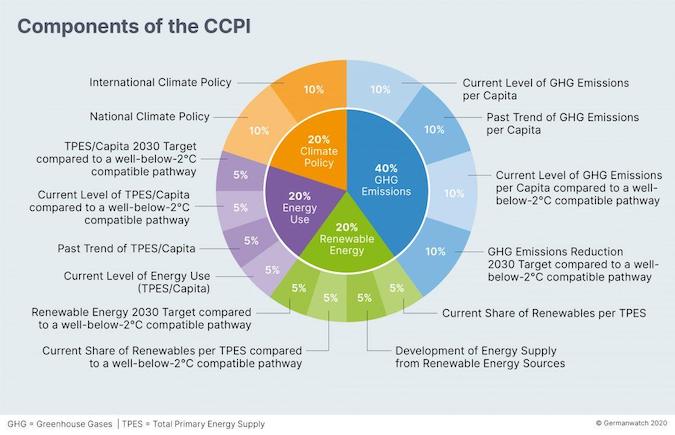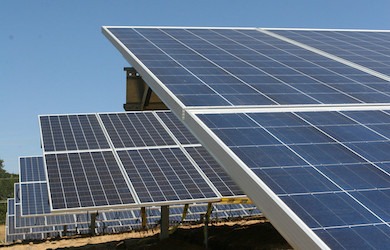The CCPI is a measure of the climate protection performance of 63 countries and the EU, which in total account for at least 90% of global greenhouse gas (GHG) emissions. It is an independent monitoring tool that was first published in 2005 and is updated annually. The results are compiled with help from 450 national experts who evaluate their respective countries’ most recent national and international climate policies. This is then distributed to major worldwide media organisations and is a common point of reference in parliamentary and governmental level debates [1].
The graphic below [2] shows the components that make up the CCPI. It uses 14 indicators (outer circle) that fit into the following four broad categories:
- GHG Emissions (40% of overall score)
- Renewable Energy (20% of overall score)
- Energy Use (20% of overall score)
- Climate Policy (20% of overall score)

Figure 1: Components of the CCPI [2]
80% of the assessment is based on quantitative data from internationally recognised institutions. The results are rated as very high, high, medium, low, or very low.
The CCPI methodology was revised in 2017 to incorporate the Nationally Determined Contributions (NDCs) that were put forward by countries as part of the negotiations of the Paris Agreement. NDCs are countries’ self-defined commitments made under the Paris Agreement to cut GHG emissions and adapt to climate impacts. Each country is required to establish NDCs and update them every five years.
No country has ever achieved a performance across all indicators that can be qualified as very high, because no country fulfils the requirements to limit global warming to well below 2°C, as agreed in the Paris Agreement.
General Trends
Denmark is the highest-ranked of all countries surveyed in 2024, and also was in 2023 and 2022. However, if you look at the values of the CCPI, it has stayed relatively stable within that time. CCPI national experts for Denmark claim that national climate action has nearly paused since October 2022 when national elections were called. There are a few noticeable things here; firstly that Denmark is so far ahead of other countries that even though the current CCPI is below the level in 2022, it is still the top ranked country. And secondly even though it is the top ranked country, the national experts fear that the country will not meet its national targets for 2025 and 2030, and the CCPI does not rank as very high.
Saudi Arabia have been one of the worst performers since their CCPI has been measured, and were the worst-ranked this year. In fact, its per capita greenhouse gas emissions are rising steadily. Iran, South Korea, Canada and Russia are commonly seen near the bottom. The UAE has been measured for the first time this year, and enters the ranking at third bottom. These countries have high per capita greenhouse gas emissions, and need to improve in multiple aspects to improve their CCPI.
Biggest Changes From 2023 to 2024
Since the change in Brazil’s presidency back to Lula da Silva in January 2023, the administration has restricted deforestation and promoted the expansion of renewables. The CCPI of Brazil has jumped from 48.39 to 61.74 from 2023 to 2024, which is a jump of 15 places in the rankings table to 23rd place.
On the other hand, it is disappointing to see that the UK had the biggest drop in CCPI in the last year. The UK’s CCPI was steadily increasing and reached the second highest of all countries surveyed in the 2021 rankings. It further increased in 2022, although it fell down a little in the rankings due to other countries performance. However, there was a massive dropoff in 2023 and the measure has stayed almost the same for 2024, where the UK is now ranked 20th. This almost perfectly aligns with Rishi Sunak’s time as prime minister since October 2022, during which the UK Conservative government has pulled back multiple pieces of climate legislation and made various negative changes. The CCPI.org website outlines some reasons for the CCPI value going down [3]:
- Increasing domestic fossil fuel extraction by approving a new coal mine in Cumbria;
- Granting hundreds of new oil and gas licenses in the North Sea;
- Delaying a ban on new combustion engines from 2030 to 2035;
- Halting a plan to stop the installation of new gas boilers in homes by 2035;
- No offshore wind projects were approved in 2023;
These changes tell us that the CCPI can be heavily influenced by a change in leadership of the country, within the same political party or to a different party, because of changes in national climate-related policy that can occur. The CCPI seems to be quite a volatile measure and there are a number of examples where the value has changed significantly from one year to the next.
Conclusions
The CCPI is a measure the overall performance of countries in reducing GHG emissions and promoting renewable energy, in order to meet targets agreed in the Paris Agreement. It can change quite significantly from one year to the next based on national policy changes. The CCPI can be used as a tool for tracking countries’ climate action performances over time, and to compare a country’s performance with others.
The current performance of countries shows how far behind the world is in meeting the goals that the Paris agreement set. The UN confirmed this in a report they published in September 2023. However, the same report also noted on the positive side that “Against forecasts made prior to its adoption, the Paris Agreement has led to contributions that significantly reduce forecasts of future warming”. It will be interesting to see where we are at 2030, and then as we come to 2050.
If we are still around by then.
About Pager Power
Pager Power undertakes technical assessments for developers of renewable energy projects and tall buildings worldwide. For more information about what we do, please get in touch.
References
[1] “CCPI Philosophy and Team,” [Online]. Available: https://ccpi.org/ccpi-philosophy-team/. [Accessed 14 February 2024]
[2] “CCPI Methodology,” [Online]. Available: https://ccpi.org/methodology/. [Accessed 14 February 2024].
[3] “United Kingdom,” [Online]. Available: https://ccpi.org/country/gbr/. [Accessed 14 February 2024].
Thumbnail image accreditation: Unsplash.com (Aug 2022). Last accessed on 19th February 2024. Available at: https://unsplash.com/photos/digital-artwork-on-air-pollution-and-climate-change-theme-power-and-fuel-generation-in-czech-republic-european-union-MZohFzAgW9A



